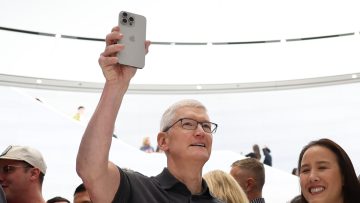When Apple released the iPhone 5s in 2013 with a Touch ID fingerprint scanner, it was immediately obvious that the company had once again steered the entire industry in a new direction. It wasn’t the first time a fingerprint scanner had been included on a smartphone, but earlier examples provided limited utility and terrible user experiences. As it so often does, Apple righted all those wrongs and released the fastest fingerprint sensor the world had ever seen on a smartphone, and it was far more useful than the scanners we had seen before.
Needless to say, Apple’s rivals like Samsung scrambled to copy this exciting new feature. In doing so, they ended up releasing rushed products with horribly flawed user experiences that were no match for Touch ID, even in its early days when it wasn’t anywhere near as fast or as reliable as it is now. Fast-forward to 2017, and it appears as though history may soon repeat itself with the iPhone X.
We’ve seen facial recognition on several smartphones before, but it looks like Apple will once again be the first company that does it right. While smartphone makers like Samsung have used normal front-facing cameras and rudimentary tech that is reportedly quite simple to bypass, Apple is going in a different direction.
The company took years to develop the TrueDepth camera system that enables Face ID on the iPhone X. Using a combination of sensors and cameras located in the phone’s controversial “notch,” the TrueDepth camera uses advanced technologies that incorporate a dot projector, a proximity sensor, an infrared camera and more. The result is a solution the likes of which we’ve never seen before in a smartphone.
Now, Apple’s rivals are reportedly scrambling to copy it.
Android vendors will be quick to copy Face ID, of that there is precious little doubt. If history has taught us anything, we can also expect early examples of these copies to be fairly awful. But that’s not even the bad news. The real crime here is that a new report from the world’s top mobile insider suggests that Android vendor’s Face ID copies may come at the expense of one of the coolest new developments in the mobile industry.
Remember back in June when Qualcomm announced a new type of fingerprint sensor that could work through displays, water, or even through metal? Well, those awesome new scanners might never proliferate. According to a recent note from well-known KGI Securities analyst Ming-Chi Kuo, interest in 3D scanning tech among rival companies has exploded since Apple unveiled the iPhone X.
Not only that, but the analyst says these vendors are moving away from under-display fingerprint scanners in the process. If facial recognition truly is the future of smartphone authentication as Apple says it is, why bother investing all that time and millions upon millions of dollars in order to implement fingerprint scanners that are merely a stopgap solution?
There are already early rumors that suggest Samsung is hoping to embed a fingerprint scanner beneath the Galaxy Note 9’s display later this year, but Samsung hasn’t really been a trendsetter since it helped popularize the phablet category back in 2011. If Apple does decide to move away from fingerprint scanners in all of its phones moving forward, we can likely expect the rest of the industry to follow closely behind.








